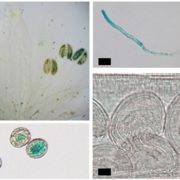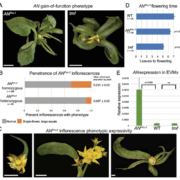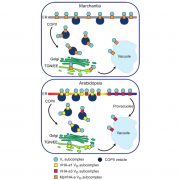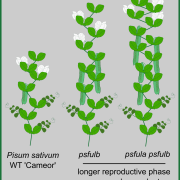SHUKR in the sporophytic tissue directs male gametophyte development in Arabidopsis
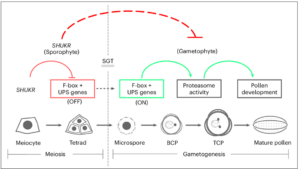 In flowering plants, reproduction involves the alternation of two generations: the diploid sporophyte and the haploid gametophyte. Traditionally, the male gametophyte was thought to develop autonomously with minimal regulation by the sporophyte. However, recent research by Sivakumar, Pandey, and Ramesha et al. challenges this view, identifying the SHUKR (SKR) gene in Arabidopsis, which plays a crucial role in male gametophyte development through the ubiquitin-proteasome system. The Arabidopsis SHUKR gene encodes a 119 amino acid protein present only in eudicots, but with no homology to other protein families. Using proSKR:GFP-gSKR reporter lines, SKR protein was detected in male meiocytes from prophase to the tetrad stage, suggesting its function in halting the gametophytic developmental program. The authors performed RNA-sequencing of meiotic anthers to reveal that misregulation of F-box genes leads to premature expression of gametogenesis-related proteins, causing defective pollen development and reduced fertility in the skr-1 mutants. This study also highlights the rapid evolution of the SHUKR protein family in eudicots, suggesting its adaptive role in gametophyte development across diverse plant species. The intense selective pressure on SHUKR and its regulatory control over F-box genes underscore the importance of protein turnover in male gametophyte diversification. These findings challenge the long-held paradigm of male gametophyte autonomy, providing compelling evidence that sporophytic regulation, influenced by internal and environmental factors, actively shapes gametophyte development. This research offers novel insights into plant reproductive strategies and evolutionary biology. (Summary by Gourav Arora @gourav_arora_g) Nature Plants 10.1038/s41477-025-01932-y
In flowering plants, reproduction involves the alternation of two generations: the diploid sporophyte and the haploid gametophyte. Traditionally, the male gametophyte was thought to develop autonomously with minimal regulation by the sporophyte. However, recent research by Sivakumar, Pandey, and Ramesha et al. challenges this view, identifying the SHUKR (SKR) gene in Arabidopsis, which plays a crucial role in male gametophyte development through the ubiquitin-proteasome system. The Arabidopsis SHUKR gene encodes a 119 amino acid protein present only in eudicots, but with no homology to other protein families. Using proSKR:GFP-gSKR reporter lines, SKR protein was detected in male meiocytes from prophase to the tetrad stage, suggesting its function in halting the gametophytic developmental program. The authors performed RNA-sequencing of meiotic anthers to reveal that misregulation of F-box genes leads to premature expression of gametogenesis-related proteins, causing defective pollen development and reduced fertility in the skr-1 mutants. This study also highlights the rapid evolution of the SHUKR protein family in eudicots, suggesting its adaptive role in gametophyte development across diverse plant species. The intense selective pressure on SHUKR and its regulatory control over F-box genes underscore the importance of protein turnover in male gametophyte diversification. These findings challenge the long-held paradigm of male gametophyte autonomy, providing compelling evidence that sporophytic regulation, influenced by internal and environmental factors, actively shapes gametophyte development. This research offers novel insights into plant reproductive strategies and evolutionary biology. (Summary by Gourav Arora @gourav_arora_g) Nature Plants 10.1038/s41477-025-01932-y


